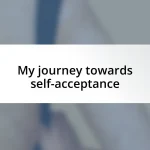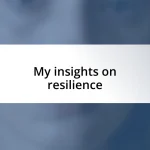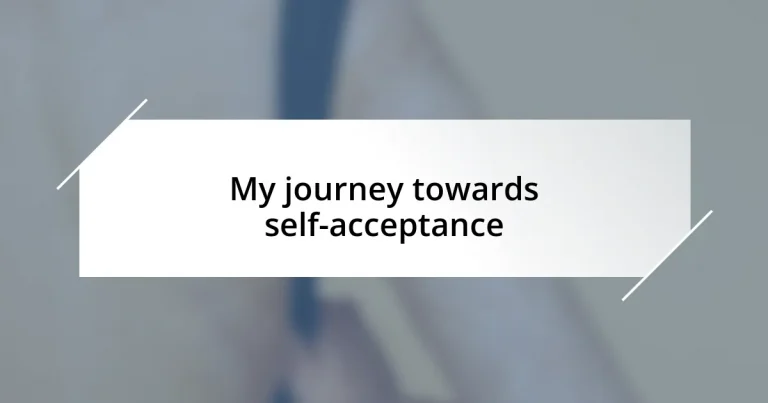Key takeaways:
- Self-acceptance involves embracing flaws and uniqueness, allowing for genuine self-love and profound connections with others.
- The interplay between self-esteem and self-acceptance highlights how positive self-perception influences relationships and overall well-being.
- Mindfulness, self-affirmations, and building a supportive network are key strategies for cultivating self-compassion and personal growth.
- Recognizing and celebrating one’s unique journey, including imperfections and challenges, fosters authenticity and deeper self-acceptance.
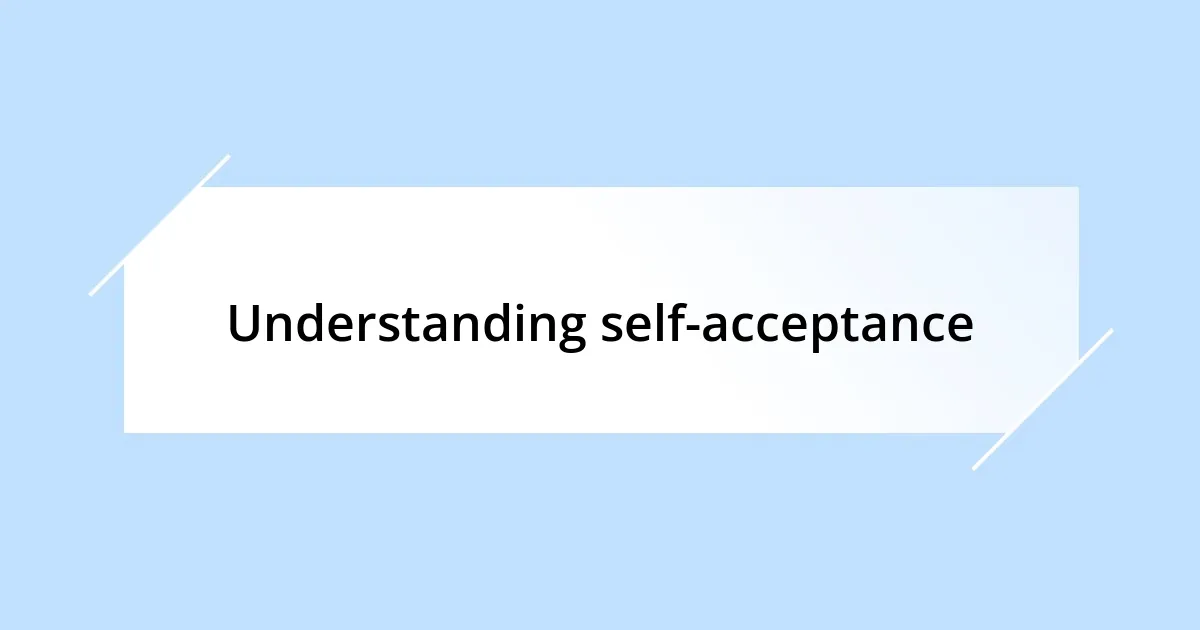
Understanding self-acceptance
Self-acceptance is more than just liking who you are; it’s about embracing your entire being, flaws and all. I remember a time when I loathed aspects of myself that didn’t fit society’s mold. It took a long journey to realize that those quirks made me unique and worthy of love.
When I think about self-acceptance, I often reflect on the question: “What would it be like to be completely at peace with myself?” It’s liberating. I once struggled with my body image, constantly comparing myself to others. But then, I began to appreciate my body for the experiences it allowed me to have—what a game changer that was!
To truly understand self-acceptance, one must confront the fear of vulnerability. I vividly recall sharing my insecurities with close friends, and the relief I felt when they responded with understanding instead of judgment. That openness paved the way for profound connections and a greater appreciation for my authentic self.
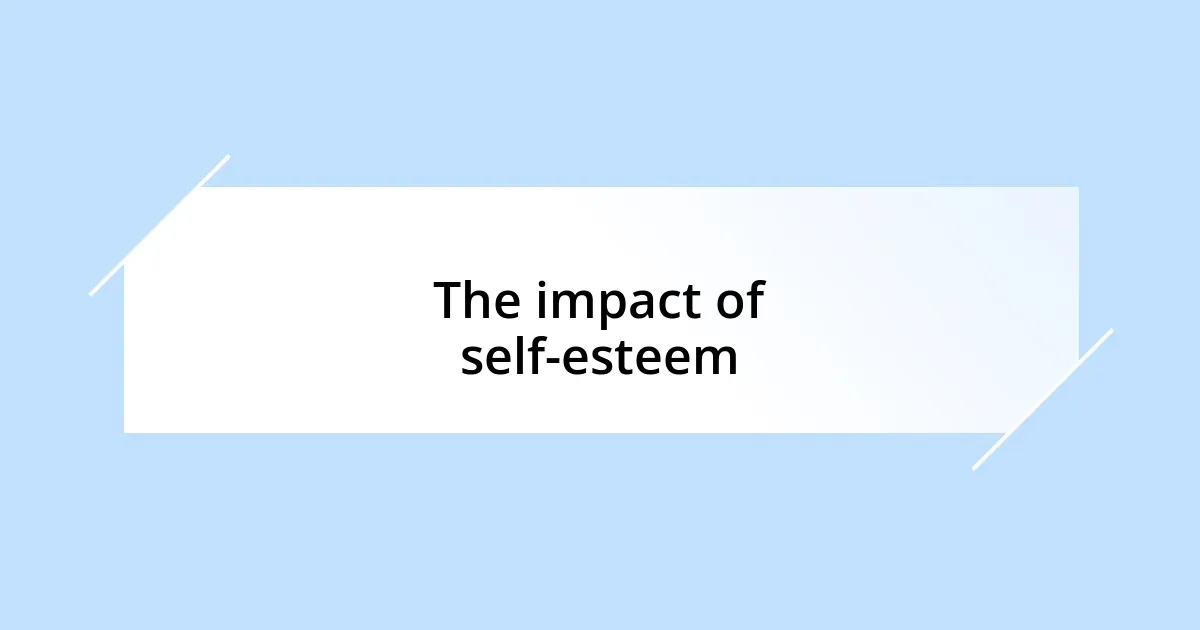
The impact of self-esteem
The relationship between self-esteem and self-acceptance is profound. I’ve experienced this firsthand; there were times when my self-esteem was at an all-time low, stemming from constant self-criticism and a fear of judgment. I noticed that my perspective shaped my interactions. When I felt good about myself, I radiated confidence, and those around me responded positively. Conversely, during those bleak moments of doubt, I withdrew. I questioned every compliment, convinced that I wasn’t deserving of it.
- Self-esteem influences how you perceive relationships, often determining how much love and support you believe you’re worthy of.
- A boost in self-esteem can foster resilience, allowing individuals to face challenges without crippling self-doubt.
- When I acknowledged my accomplishments, even the small ones, it gradually shifted my internal dialogue, leading to more constructive self-talk.
- The cycle of self-esteem and self-acceptance is continuous; nurturing one inevitably supports the other.
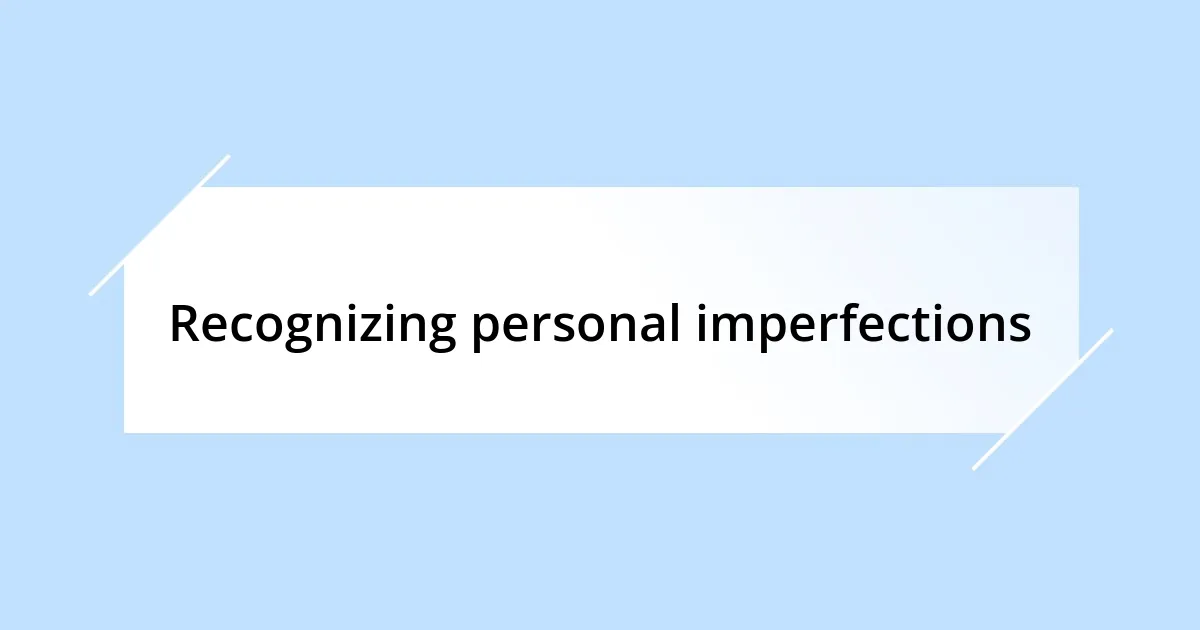
Recognizing personal imperfections
Recognizing personal imperfections can be a profound experience. I often found myself staring in the mirror, critiquing every flaw. One day, I decided to try something different. Instead of focusing on what I perceived as shortcomings, I turned my attention to what I could learn from them. This shift in perspective felt like a weight lifting off my shoulders, allowing me to appreciate my uniqueness.
Acknowledging imperfections can be uncomfortable, but it often opens the door to personal growth. I remember when a trusted mentor pointed out my tendency to overthink. Initially, I was defensive, but taking a step back allowed me to see that this trait, despite its challenges, had also helped me become more empathetic. Embracing this aspect of myself has since transformed my interactions, making them richer and more meaningful.
As I reflect on my journey, I realize that accepting imperfections fosters authenticity. I used to hide behind a façade of perfectionism, but the more I embraced my quirks, the more comfortable I became in my skin. It’s not just about recognizing these imperfections; it’s about celebrating them as parts of my story, shaping who I am and how I connect with others.
| Imperfection | Positive Insight |
|---|---|
| Overthinking | Enhanced Empathy |
| Body Image Issues | Motivation for Health |
| Procrastination | Creativity in Pressure |
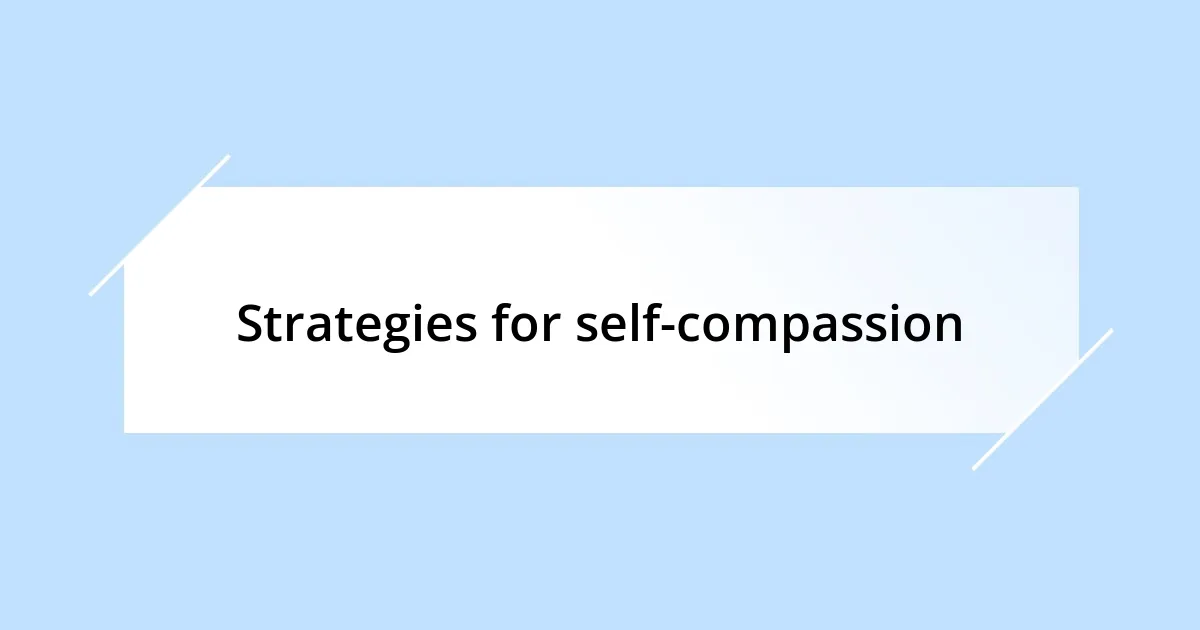
Strategies for self-compassion
Building self-compassion is a journey that often requires practical strategies. One method that has helped me is the practice of mindfulness. I remember sitting quietly, focusing on my breath, and allowing my thoughts to flow without judgment. This simple act provided me with the space to be gentle with myself, reminding me that it’s okay to feel overwhelmed sometimes. How often do we rush to criticize ourselves instead of acknowledging our feelings? Embracing mindfulness taught me that my emotions are valid, providing a soft landing in moments of self-doubt.
Another effective strategy has been the practice of self-affirmations. I started by writing down positive statements about myself—things I truly believed or even wanted to believe. Each morning, I would read them aloud, feeling a shift in my mood. It felt strange at first, almost like I was playing a role, but over time, these affirmations began to resonate deeply within me. Have you ever tried speaking kindly to yourself? There’s a certain power in those words that can liberate us from negative thinking patterns.
Lastly, I’ve found that connecting with supportive friends is vital for nurturing self-compassion. Sharing my thoughts and feelings with trusted confidants allowed me to see my struggles from different perspectives. One evening, during a heart-to-heart with a friend, I realized how common our feelings of inadequacy were. This sense of community reminded me that I was not alone in my experiences. Have you considered who you share your experiences with? Surrounding ourselves with empathetic listeners can foster a nurturing space for self-acceptance to blossom.
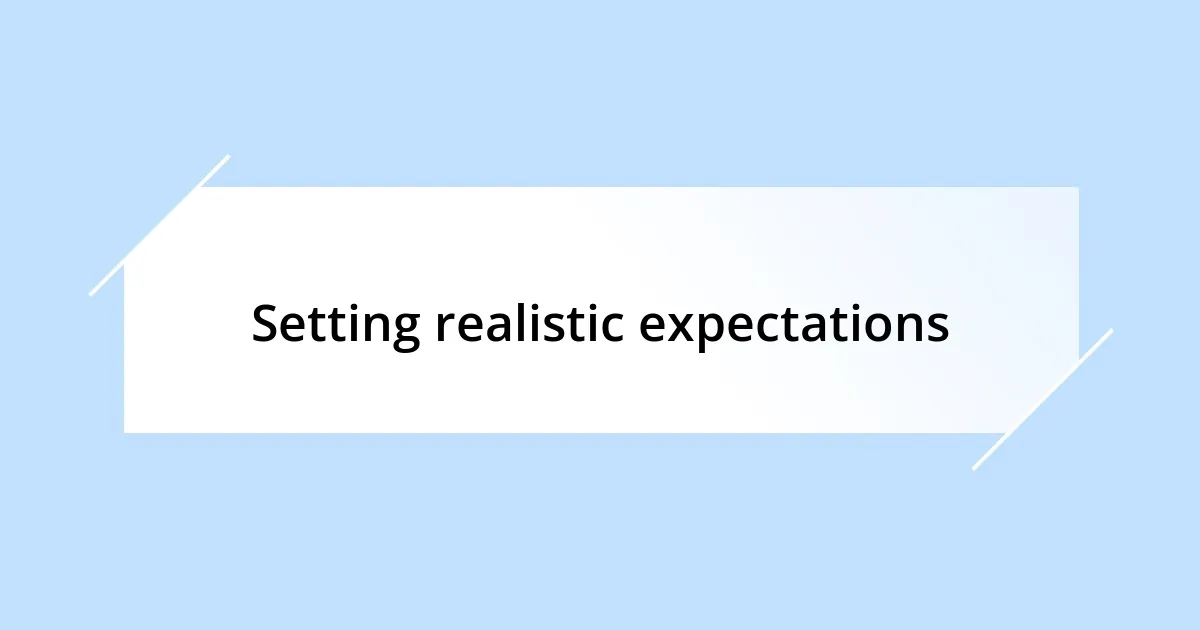
Setting realistic expectations
Setting realistic expectations has been a game-changer for my journey toward self-acceptance. I vividly remember when I set out to complete a challenging workout program. I dove in with ambitions that were way beyond my current fitness level. After a grueling week, I realized that my expectations needed adjustment—not lowering my goals, but rather framing them in a way that was achievable and realistic. Have you ever felt the sting of disappointment because you aimed for something too lofty? I learned that celebrating small victories along the way made the process much more enjoyable and sustainable.
There was a time when I expected my emotional recovery to be instantaneous. I thought I could simply decide to feel better, but the reality was quite different. I soon understood that healing takes time and patience. I remember journaling about my daily struggles and breakthroughs, and this practice reminded me to acknowledge my progress, no matter how small. It was enlightening to realize that even one positive thought a day was a step forward. Have you ever kept a record of your feelings? I found that documenting my journey fostered a deeper connection with myself, allowing me to establish more realistic milestones.
Every time I set a new goal, I try to remind myself about the balance between ambition and feasibility. Just the other day, I wanted to change multiple habits at once. However, I took a step back and thought about my previous experiences, which taught me that tackling one habit at a time yields better results. It’s easy to feel overwhelmed when we try to do too much, right? I’ve learned that breaking my objectives into bite-sized pieces not only reduces stress but also keeps me motivated. When I celebrate each completed step, I realize it’s the journey, not just the destination, that truly matters in my quest for self-acceptance.
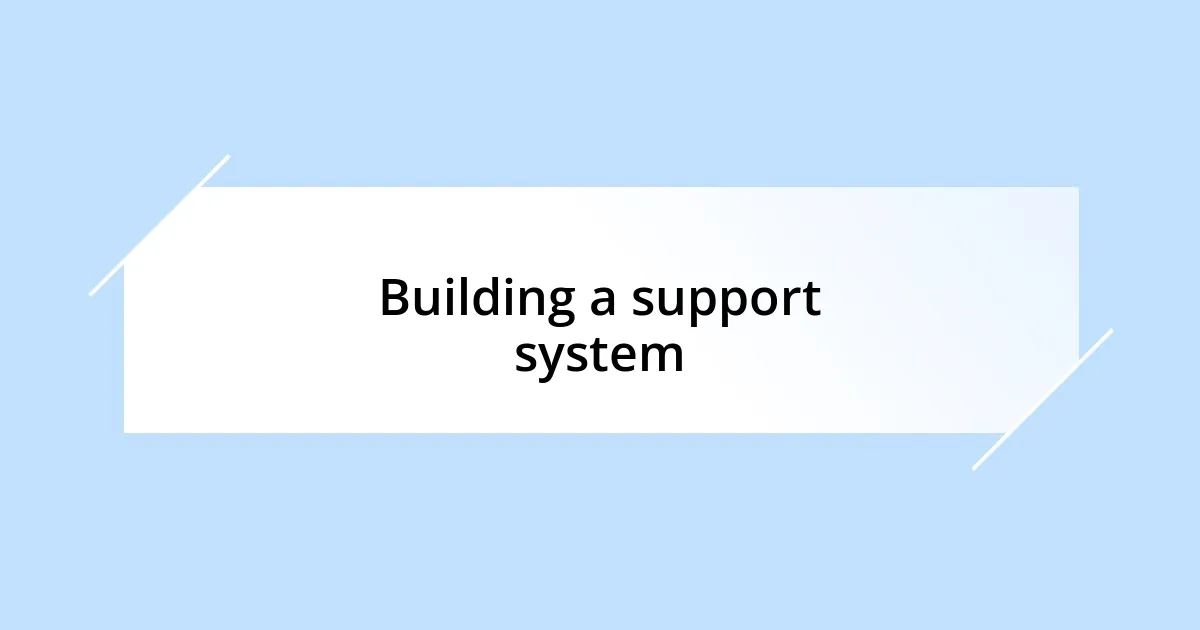
Building a support system
Creating a support system has been one of the most crucial aspects of my journey towards self-acceptance. I still remember the moment I reached out to a local support group. It felt vulnerable at first, sharing my struggles with strangers, but it turned out to be a turning point. Have you ever found that talking to others can help lighten the emotional load? It was comforting to find people who truly understood what I was going through, which made me feel less isolated in my experiences.
As I built my network of supportive individuals, I began to realize the importance of surrounding myself with positivity. There was a time I consciously chose to spend less time with those who drained my energy and critiqued my every move. Instead, I gravitated towards friends who uplifted my spirit and encouraged me to embrace my authentic self. Isn’t it amazing how the right people can influence our mindset? These connections helped amplify my self-acceptance journey, providing a safety net that allowed me to open up and explore my feelings without fear of judgment.
I also learned that support systems can come in unexpected forms. For instance, I once joined an online forum where members shared their personal experiences related to self-acceptance. Initially, I hesitated to contribute, thinking my story was too mundane. But when I finally wrote about my challenges, I was met with warmth and understanding from others. Have you ever discovered a sense of belonging in a new community? This experience taught me that opening up can foster powerful connections, and sometimes, the most significant support comes from those we least expect.

Embracing your unique journey
Embracing your unique journey is about honoring the path you’ve taken, even when it diverges from societal norms. I often find myself reflecting on the times I felt pressured to fit a mold, whether in my career or personal life. Do you remember moments when you tried to emulate someone else’s journey? I can vividly recall attending a networking event where everyone seemed to have it all figured out, while I still felt lost. That feeling of disconnect made me realize that my path is uniquely mine, with its own lessons and discoveries worth celebrating.
There was a period when I struggled to accept not just my quirks but also my past missteps. I remember sitting in my garden one sunny afternoon, contemplating what it truly meant to embrace imperfections. I started to see my “flaws” as the threads that weave my story together. Have you ever thought about how your challenges shape your identity? This revelation brought me a profound sense of peace—I understood that each stumble added to my growth. Accepting where I was, with all my experiences, allowed me to take pride in my journey rather than shy away from it.
As I navigated this path of self-acceptance, I learned the beauty of individuality through simple practices like journaling. One evening, while reflecting on my day, I wrote about a decision I made that felt unconventional. It struck me how liberating it was to step away from societal expectations. Isn’t it thrilling to think that every choice you make is a brushstroke on the canvas of your life? Recognizing and celebrating those moments of divergence—where I chose authenticity over conformity—has become a cornerstone of my journey, guiding me deeper into self-acceptance.








